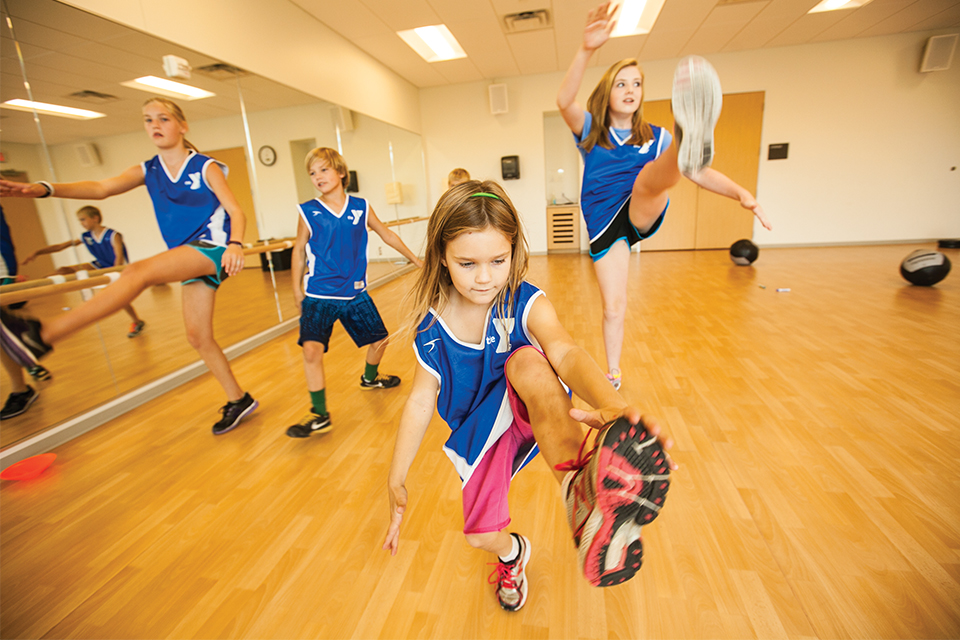Strength Training for Kids?

Strength training is absolutely appropriate for kids, starting around age 7. Whoa! Kids in the gym, lifting weights? That can’t be good for their little bodies, can it? My neighbors’ mechanics’ wife’s son’s babysitter said that kids shouldn’t lift weights. The Mayo Clinic and American College of Sports Medicine (ACSM) both agree that strength training for youth is appropriate and a great way for kids and their parents to spend quality time together.
Before we go into detail, let’s define a couple of terms: strength training involves appropriate exercises in which you push or pull against a force in order to increase muscle strength. This is distinct from weight lifting, in which individuals lift heavy weights, usually in preparation for competition or to bulk up their muscles. Weight lifting is generally not appropriate for young bodies. Strength training—good for younger kids; weight lifting—after you get your driver’s license.
So, if you are a parent reading this and are asking, “My kids are so busy with soccer, ballet, couch surfing, band camp, and sleeping; why would they need to do any strength training,” the answer is: exactly for the reasons you just stated. Just like adults, kids need to spend time strength training to prepare them for the rigors of their busy lives. Also, with the incredible increase in childhood obesity because of poor diet and inactivity, opening up venues for youth to strength train will hopefully appeal to those who are not interested in team sports, didn't make the team, or don’t consider themselves "athletic." Strength training is a great equalizer. A child does not need athletic skills to strength train and become physically fit.
I recently sat down with Assistant Athletic Director, Round Rock Independent School District (RRISD) Susan Nix, who is a staunch proponent of strength training and functional movement exercises for youth, and who has created programs for non-athletes within the Round Rock Independent School District P.E. program.
Susan, why did you develop the strength training and functional movement programs in your school district?
We were concerned that the vast majority of our students weren't getting enough exercise and created a functional strength-training program that allowed every RRISD student the opportunity to participate in an athletic activity in which they weren't judged on their ability and at which they could be successful.
What results have you seen?
Kids who have never been active physically or socially were developing a healthy interest in strengthening their bodies and becoming involved in a group activity. More importantly was the increase in self-esteem and confidence we saw in these students. For an educator to see such a dramatic change in their students is extremely gratifying. We know that these kids are developing a life-long appreciation for physical fitness that will make a huge difference in their lives.
Convinced yet? Picture your children on a playground. What are they doing? Functional strength training! Climbing on monkey bars (arm, shoulder, and back strength); swinging on the swing (arm, abdominal, and hip flexor workout); running, jumping, hopping, skipping, and wrestling (coordination, core strength, and reflexes)—these are all activities that are strengthening their bodies and preparing them for a life of physical activity. Have you ever watched kittens or puppies at play? Sure, they are having fun, but they are also strengthening their bodies for a future full of physical activity that is centered on survival: hunting, running, climbing, carrying, lifting. Encourage your children to be as active as a litter of puppies. Make physical fitness fun.
Now, you might be saying “I'm convinced! I want my child to be more physically active! I want them to have a life free from diabetes, obesity, high blood pressure, and chronic fatigue. How do I do that?”
The YMCA of Austin has eight branch locations in the Austin area. Each one has Family Fitness hours and will conduct a Family Fitness orientation for youth ages 8 to 15 years to work out with a parent in the fitness room. The YMCAs also have a Fit Adolescent Safely Training (FAST) program for 12- to 15-year-olds to become certified to work out in the weight room without parental supervision. Each YMCA has fitness staff available to assist with specific exercises that you and your child can do together (austinymca.org).
RRISD has incorporated functional strength training into its P.E.programs for all middle schools and some high schools. You can contact RRISD at 512-464-5486 for more information.
Interested in reading about strength training for your child?
Google “strength training for youth”; look for articles by Avery D. Faigenbaum, Ed.D., who wrote the American College of Sports Medicine Official Statement on youth strength training.
The following sources were used for this piece:
“American College of Sports Medicine Current Comment,” written by Avery D. Faigenbaum, Ed.D., (Chair), and Lyle J. Micheli, M.D., FACSM; see also “Youth Resistance Training,” Sports Medicine Bulletin, Vol. 32 (2)
“Tween and Teen Health” (mayoclinic.com/health/strength-training/HQ01010)






